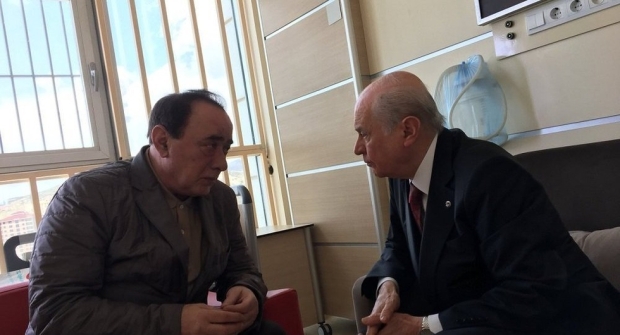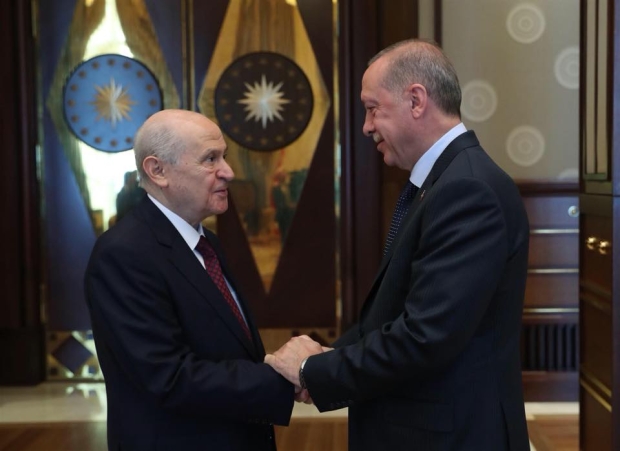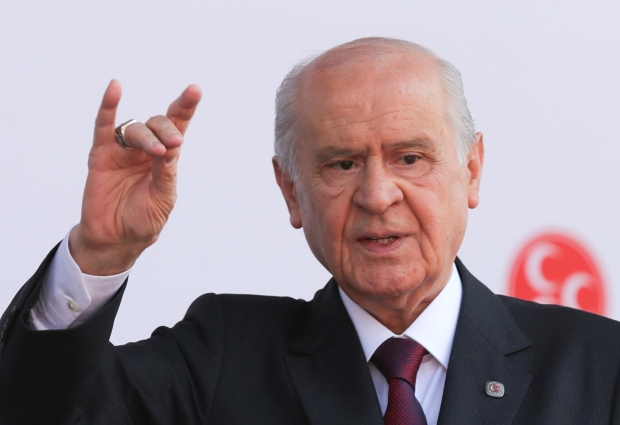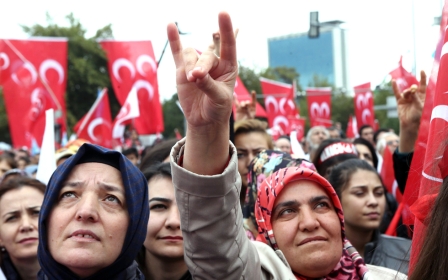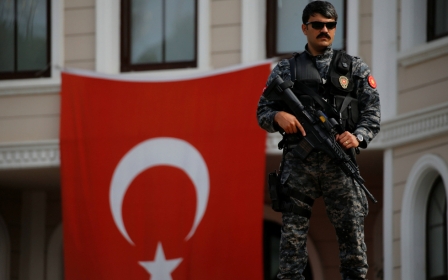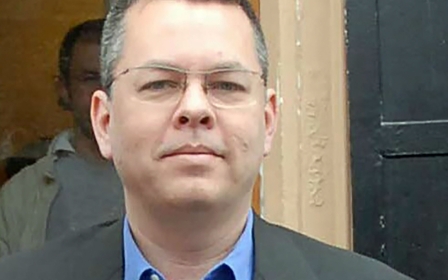The ultra-nationalist Turkish mob boss Erdogan can't touch
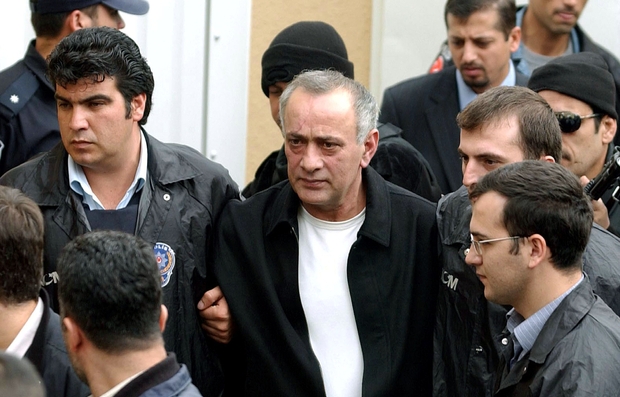
In the febrile atmosphere of modern Turkey, publicly criticising President Recep Tayyip Erdogan is a risky move - thousands of legal cases have been opened for "insulting the presidency".
Not for one man, it seems.
On 24 June, following parliamentary elections that saw Erdogan maintain a majority with the aid of the far-right Nationalist Movement Party (MHP), Alaattin Cakici took to Facebook to lambast the president for not mentioning the ultra-nationalists (or "ulkucu") or their leader Devlet Bahceli in his victory speech that night.
“You are not the owner of this state! The cornerstone of the state is the ulkucu people… do you love Turkey as much as Bahceli?" he wrote.
"Don’t forget that you are only a passenger, but ulkucu people and Turkish nationalists are the hosts! You should pray for Bahceli and his followers as you pray for your parents... I hope you won’t be self-indulgent, and serve the Turkish nation - if so, I will give you my blessing."
Cakici, a mob boss currently serving multiple sentences in prison for murder, money laundering and leading an illegal armed group, has so far received no punishment for his comments, nor has Erdogan issued any statement.
Some in Turkey have suggested that Cakici's close friendship with Bahceli - who has called for his release and visited him when he was transfered to a hospital in May - is the reason for this, a sign that the hold Turkish ultra-nationalists have over their country's president is stronger than ever.
Before Turkey’s presidential and parliamentary elections in June, Erdogan’s Justice and Development Party (AKP) and the MHP set up an electoral alliance. Not only did they run in the elections together - under new rules allegedly instigated to favour the MHP - but both parties also supported Erdogan's bid for the presidency.
The AKP ended up with 290 seats in the 600-seat parliament, losing its majority. In a surprise result, the MHP managed to increase its number of seats from 35 to 49, giving pro-Erdogan supporters a majority in the parliament - as long as the MHP maintains its support for the president.
The cooperation didn’t start with the last elections. The MHP supported and campaigned for a "yes" vote in the 2017 April referendum, which saw a shift from a parliamentary system to an executive presidential system.
The ultra-nationalist MHP has gained power in domestic politics since then and Bahceli has used this power to fulfill the demands made by his ulkucu supporters. Ulkucu literally translates as "idealist" in Turkey - the MHP's street movement is named Ulku Ocaklari (Home of Ideals), but is better known internationally as the Grey Wolves.
Ultra-nationalist legend
Cakici was sent to jail in 2004. In prison, he insulted Erdogan repeatedly and was sentenced to an additional 10-month term in 2017.
At the time, the news received little media attention as he was already incarcerated and didn't have much visibility. But this time, Cakici's case is different, as he now has the support of Bahceli, who has hailed him as a hero for his past actions as an ultra-nationalist assassin.
Cakici was first arrested after the Turkish coup of 1980. He went on trial accused of murdering 41 people allegedly involved in leftist movements. He left Turkey on the run in 1992 using a fake passport but was apprehended in France in 1998. Imprisoned in Turkey in 1999, he was released in 2002, then fled the country illegally.
When he was found in 2004 in Austria, he was carrying a special service passport under the name of a former intelligence chief.
Intelligence reports leaked to Turkish media in the early 2000s showed that that Turkey's notorious MIT intelligence service had used Cakici for “clearing terrorists” and carrying out "actions that couldn’t be taken legally”.
The mafia boss and former Grey Wolf's rap sheet, including ordering the murder of his ex-wife in 1995, was not enough to put off Bahceli.
On 12 May, in a surprise move, the MHP leader posted a tweet calling for amnesty for Cakici and another mafia leader, Kursad Yilmaz, calling them his “brothers who love their nation and country”.
And on 23 May, seemingly determined to show his support for a fellow arch nationalist, Bahceli visited Cakici when the mob boss was brought to hospital from prison. He brought up Cakici’s health problems and said it was absurd that members of the Kurdistan Workers Party (PKK) were on the streets when an ulkucu was in jail.
Hypocritical support
Adil Serdar Sacan, a former police chief involved in getting Cakici locked up in the late 1990s, told Middle East Eye that Bahceli's support for the mob boss is hypocritical, as he supported operations against the mafia while a member of the coalition government in the 1990s.
“We founded the Anti-Smuggling and Organized Crime Department in 1998, and I was the head of it until 2003. In these five years, we arrested all the mafia leaders and jailed them." said Sacan.
"Back then, the political authorities and the government hugely supported us, that’s how we could conduct those operations. The MHP and Bahceli were also a part of the coalition government. There was $14m of dirty money in Istanbul, and our courage alone was not enough to fight against them - the fight also required the firm support of politicians.
"I am a witness of Bahceli’s support for those operations against Cakici back then - as the deputy prime minister he sent messages to me declaring support. Now, he asks for the release of most of the mafia leaders. I don’t understand why, I cannot see how he changed his mind.”
'I think it’s wrong to link nationalism with the mafia. Those people are not in jail on political crimes, they are in jail because they commited organised crimes'
- Adil Serdar Sacan, ex-police chief
Turkey was governed by a coalition government between 1999 and 2002, of which MHP was a part. The AKP came to power in November 2002 and Sacan was assigned to another post.
The former police chief was keen to stress that the mafia leaders' jail terms had nothing to do with their former work for the intelligence services, so the two issues should not be linked.
“Bahceli talks about Cakici’s idealist nationalism. I think it’s wrong to link nationalism with the mafia. Those people are not in jail on political crimes, they are in jail because they commited organised crimes, killed people and so on. I find Bahceli’s stance very strange," said Sacan.
"Even if he worked for the intelligence, that doesn’t give him any rights to establish an illegal armed group, or to kill people.”
MEE called two deputy chairmen of the MHP and another MP on the parliamentary Justice Committee to ask how the party's and their leader’s stance changed and why they called for the amnesty for criminals. There was no response at time of publication.
Breaking point
The governing AKP initially did not respond to Bahceli's call for an amnesty - in fact, the police conducted an operation in May against the members of Cakici’s mafia group and arrested 57 of his men. This led Bahceli to repeat his call, this time with a deadline.
“I hope the governing party will take a step before the Ramadan Eid, we are working for it… I think an amnesty with support from all political parties will be useful when we are shifting to the new presidential system,” he said on 1 June, 12 days before the Muslim festival.
Finally, on 10 June, Erdogan commented on the issue. In one of his rallies before the elections, his supporters chanted for amnesty, and he replied “I wasn’t even answering those but now I will give an answer. I am sorry but amnesty is not on our agenda right now."
However, he did leave the door open to a future amnesty.
"If there is anything that needs to be done after the elections, it will be done," he said.
After Erdogan’s statement, the issue remained off the agenda, until Cakici “warned” Erdogan not to forget Bahceli’s support for his presidency.
Sacan said Cakici had found the courage to challenge Erdogan after the MHP helped hand the president victory in the elections.
He pointed to an attack on an Istanbul hospital carried out after it refused to treat Cakici when he was brought from prison in 2017 as evidence of the mafia boss's influence.
“Cakici still has a group outside his prison cell, and challenges the state now. If one of his supporters could attack a hospital with a gun when the hospital didn't admit Cakici, it means he still has an active group on the streets," he said.
"So it’s normal for him to step up like this. But if he can challenge the state and president, it means there isn't a will to stop him. That might be because of Bahceli’s involvement."
After Cakici's criticism of Erdogan, both the MHP and AKP kept their silence and let the issue cool down in order to prevent any tension between the two allies in parliament.
In response to a question about the AKP’s stance on a possible bill for amnesty, Yilmaz Tunc, an AKP MP who is also deputy chairman of the parliamentary Justice Committe, told MEE it was a very sensitive issue and deferred to his leader’s comments.
“Our president said that amnesty is not on our agenda. It's not possible for us to talk about it any more after his comments," he said.
"Even if the MHP is still working on the bill, that’s not our business. We can only talk about it if the bill comes to the committee. I cannot comment on it after the president says it is not on the agenda for now.”
“The parliament will decide on the amnesty in accordance with the constitution," he told MEE.
"The aim for the criminal code is to protect public order, public peace and to rehabilitate criminals, while protecting victims. Amnesties do not serve these purposes. Former amnesties were not welcomed by the public, and created new crimes and victims."
"Our president considers that would be a wrong move regarding the sense of community and crime and punishment policy. We say that we don’t think that would be useful,” he added.
Ozkan said that he could not "make any positive or negative comments about Cakici".
"People are free to speak about their opinions, all the citizens should follow the rules of the individual rights and freedoms.”
Threat for journalists
While the issue continues to simmer between the AKP and MHP, Cakici becomes more powerful in his prison cell.
A Turkish daily newspaper, Karar, used Cakici’s comments about Erdogan in a headline the very same day, apparently offending the mafia boss.
He released another statement threatening the newspaper and six columnists: Hakan Albayrak, Etyen Mahcupyan, Akif Beki, Gurbuz Ozaltinli, Ali Bayramoglu and Elif Cakir.
“They will be punished by the people who love me in Turkey or abroad," he said. "That’s my call to people who love me, they should perform their tasks.”
Mahcupyan was not just targeted by Cakici. Right after the elections, Bahceli released a statement with a list of 70 journalists, including Mahcupyan, attacking them for slandering the MHP during the election campaign. The list and the statement were harshly criticised by journalists' unions.
Karar's office building has been protected by the police since Cakici’s statement, as his threats are not usually just bluster.
In 1994, he had another journalist, Hincal Uluc, shot in the leg after he wrote an article about Cakici’s wife. He was sentenced to three years and four months in prison. Uluc did not respond to MEE's calls to comment on the incident.
After his threats against the Karar coloumnists, the public prosecutor’s office in Ankara started an investigation against Cakici.
After the removal of the article, Cakici declared that he had delayed his call to his followers for three months via his lawyer, who said: “If they won’t repeat the same mistake for three months, the call will be delayed indefinitely.”
According to Sacan, Cakici will be more dangerous if he is released and, following an amnesty, journalists wouldn't be the only people under threat.
“If there is an amnesty for the mafia leaders, it would be very dangerous for Turkey’s public order. We would turn back to 1998, all the mafia groups would fight against each other to get their power again. Innocent people will be hurt.”
New MEE newsletter: Jerusalem Dispatch
Sign up to get the latest insights and analysis on Israel-Palestine, alongside Turkey Unpacked and other MEE newsletters
Middle East Eye delivers independent and unrivalled coverage and analysis of the Middle East, North Africa and beyond. To learn more about republishing this content and the associated fees, please fill out this form. More about MEE can be found here.


